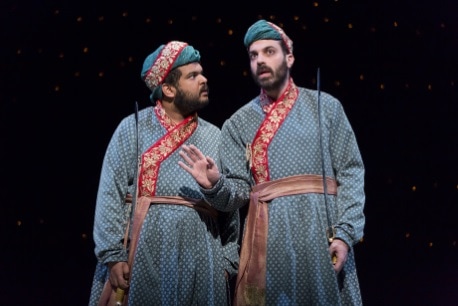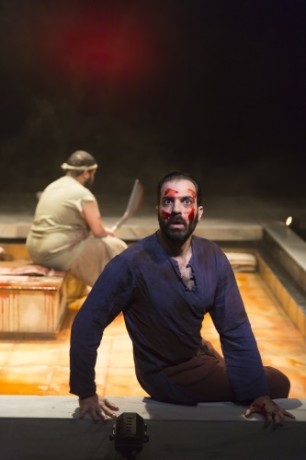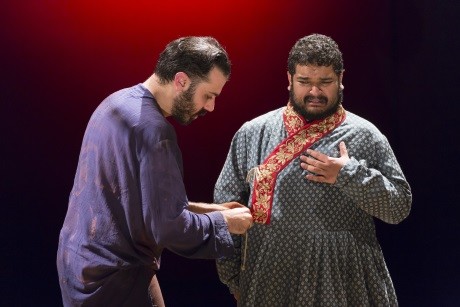Rajiv Joseph’s Guards at the Taj, now playing at Woolly Mammoth Theatre Company, provokes its audience with grand flamingo visions, with horrific buckets of blood, with aesthetic debate on the role of art in society, with the Nuremberg Defense (“I was just following orders.”) or maybe its democratic equivalent (Majority Rule).

In Guards at the Taj, playwright Joseph takes us to Hindustan, circa 1650, to the grand opening (or unveiling) of the Taj Mahal, one of the greatest architectural and artistic achievements in human history.
Two young men are assigned guard duty. They are to stand motionless and speechless before the Taj’s majestic aura.
The problem: one of the young men, Babur (Kenneth De Abrew) cannot keep his mouth shut. By the way, Babur shares his name with the founder of the Mughal Dynasty (actually the Timurid Empire whose roots go back to the Mongol Empire of Ghengis Khan).
He also cannot stay still, or even arrive on time. Obviously, he shouldn’t have become a soldier, but considering the job market….
His friend, Humayun (Ethan Hova), is much more soldier-like; after all, his father is head of the royal guards, and with any luck Humayun will take over that position.
Then the unthinkable happens (or, unfortunately, the all too thinkable.) Shah Jahan, the kingdom’s Islamic Emperor, orders the “de-handing” of all the artisans and architects who built the Taj.
“Why?” one might ask. Did he find a flaw in his mausoleum’s commemoration to his favorite, recently departed queen? No–just the opposite.

The Taj is perfect.
The Taj is divine.
The Taj is beauty incarnate.
And in Shah Jahan’s infinite wisdom, only a fool would want these artisans making anything else that might rival the Taj’s beauty, if only to fall short.
Just to be clear: there is no historical evidence that Shah Jahan actually ordered 20,000 artisans to lose their hands. There is rumor only.
In order words, there is a legend.
Rajiv Joseph brings that legend to life when he has his two ill-fitting guards take up the task of de-handing 20,000 workers.
One of the 20th century’s greatest playwrights, Bertolt Brecht, coined the theatrical term Verfremdungseffekt, or alienation effect. The effect is rooted in theatre’s ability to make an emotional event “strange” or distant and, thereby, make it viewable, so as to better understand it. For Brecht, such an effect was necessary if one were going to explore one’s own cultural milieu. A direct approach would meet far too much audience resistance to be received quietly.
By taking us to Hindustan and to its empire’s most glorious aesthetic achievement, Woolly’s production of Guards at the Taj takes us into the heart of every person who has stood before the vanity of institution and empire and been told “to follow orders.”
By playwright Joseph giving them contemporary speech patterns, and director John Vreeke, 21st century behavioral traits, both actors resonate with the immediacy of now.
The duties they perform, and the horrors they commit are as American as Dresden, or Mi Lai, or Flint, Michigan.
In this sense, every human rights violation has been carried out by an ordinary human being follow orders. And then some other ordinary person covering up the atrocity.
Whether it’s a nation’s evil “other” guy doing the deed or one of our own “good” guys ordering the slaughter, the whimsy of State official power has devastating consequences. Not just for those who suffer the action, but also for those who have to carry it out.
For the consequence for disobedience is always high. There are no whistleblower laws strong enough, or enforceable enough, to protect us from the fallout.
Woolly’s Guards at the Taj cuts to the bone. Its thrust staging dumps its horror right in the audience’s lap, and it makes no difference if laughs are a part of the show. The action is no laughing matter.

The dichotomy of power is clear. The powerful, with their institutions and armies, order and the powerless either carry out those orders or suffer a life unfulfilled.
But beauty is clear also, the beauty that lightens the soul and transports the mind to places far way and not nearly so despairing.
Set Designer Misha Kachman, working closely with Lighting Designer Jen Schriever, does not give us the Taj Mahal; for its beauty is not the stuff of dreams. Together, they give us a different kind of beauty.
In his famous poem, “Thirteen Ways of Looking at a Blackbird,” Wallace Stevens wrote:
I do not know which to prefer,
The beauty of inflections
Or the beauty of innuendoes,
The blackbird whistling
Or just after.
Innuendoes yes, as we contemplate the Taj, the beauty of its implications abound, but also the beauty of the blackbird, or the flamingo, or the flock, takes hold of us.
For we have the imagination to embraces such wonder, and that is the most powerful beauty of all.
The two-hander Guards at the Taj is theatre on a grand, if imaginary, scale.
Running Time: 90 minutes, with no intermission.
Guards at the Taj plays through February 28, 2016 at Woolly Mammoth Theatre Company – 641 D Street, NW, in Washington, DC. For tickets, call the box office at (202) 393-3939, or purchase them online.
LINK:
Guards at The Taj reviewed by David Gerson on DCMetroTheaterArts.





